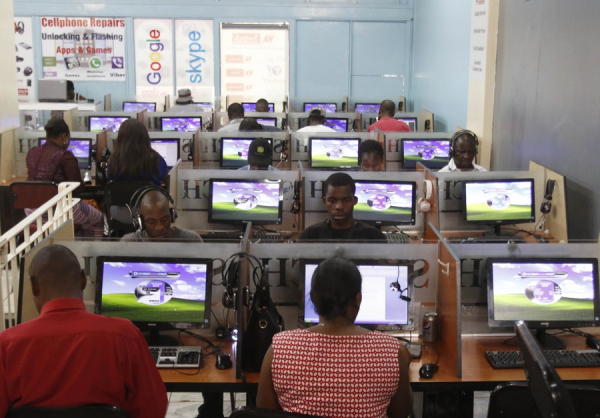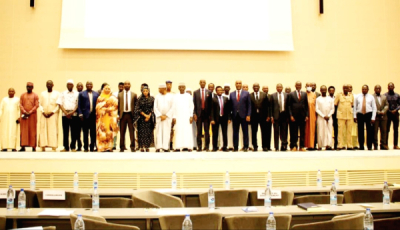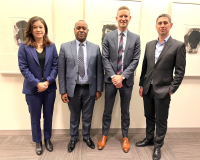With demand for broadband connectivity accelerating across Africa, South African authorities want to provide more capacity to enable Internet service providers to meet the needs.
In the recently published draft amendment to the current radio frequency regulations, South Africa’s ICASA proposed additional radio spectrum for the provision of high-speed wireless internet.
ICASA explains that its decision to update the regulations is justified "by the need to keep the provisions of the regulations current with the existing and emerging technologies aimed at revolutionizing the electronic communications sector." It, therefore, proposes the allocation of the lower part of the 6 GHz band (5925 MHz to 6425 MHz), as well as the 122 GHz to 246 GHz band for non-specific short-range applications.
The ICASA's decision follows pressure from South Africa's Internet service providers in recent months to free up more spectrum in the 6 GHz band. According to the Wireless Access Providers Association (WAPA), this band is expected to enable the deployment of Wi-Fi 6E, the latest Wi-Fi technology, fetching up to US$57.76 billion to the rainbow nation over the next ten years.
According to ICASA, the release of additional spectrum in the 6 GHz band "will provide a much-needed boost for Wi-Fi availability and uptake, and is expected to enable faster data communications between devices connected to wireless infrastructure, reduce latency, and improve efficiency and data throughput."
Isaac K. Kassouwi
Zimbabwe's economy is largely dependent on the exploitation of natural resources. With the fourth industrial revolution underway, Harare wants to make digital technologies the foundation of the country's development by 2030.
Zimbabwe approved, Tuesday (Dec.20), the national 2023-2030 broadband program. The program aims to accelerate broadband penetration in the country and reduce the cost of access to 2% of the average monthly income per capita from the current 10.1%.
The program plans several key projects that will be funded by the government and private investors. In addition, a broadband committee will be established to provide a periodic assessment of progress, facilitate coordination and collaboration, and make suggestions for adjustment.
The broadband program is part of the Emmerson Mnangagwa government's strategic vision to make Zimbabwe a high-income economy by 2030. The government wants to drive access and adoption of broadband services across government agencies, businesses, households, and individuals to transform Zimbabwe's growth trajectory from one driven largely by natural resource exploitation to one driven by innovation.
For Minister of Information Monica Mutsvangwa, “the importance of broadband and its transformative benefits include the following: enhancement of global competitiveness, job creation, increased productivity, improved national security, and enhancement of performance in education, agriculture, health, and governance. [...] All of these are prerequisites for achieving the Sustainable Development Goals.”
Isaac K. Kassouwi
In recent years, voices against sexual assaults have grown louder worldwide. In that context, to give voice to victims and eventually prevent such acts, Moroccan authorities have set up a digital solution.
Kolonamaak is a support platform developed by Moroccan authorities for women and girls in vulnerable situations. It allows users to "report any abuse or violence suffered by women and girls, and to direct them to the appropriate authorities."
The solution was launched on January 29, 2020, and was set up on the instructions of Her Royal Highness Princess Lalla Meryem, President of the National Union of Moroccan Women (UNFM).
Its Android and iOS apps help localize women in case of emergency. They just have to dial 8350 to reach support and get directions on the competent authorities to reach out to.
The solution also helps them get coaching after a major trauma. Among other things, it offers various tips on "employment opportunities, training, business creation or income-generating projects at the local and regional levels.”
Since its launch, the Android version has already been downloaded more than a thousand times on PlayStore.
Adoni Conrad Quenum
Data security has become a concern in almost every industry with the development of digital tools. In Ghana, a startup has partially tackled the issue with a solution that allows microfinance institutions to build digital trust by letting their customers “know that their money and data are safe.”
Fluid is a digital solution developed by Ghanaian startup Fluid Finance Technologies. It allows microfinance institutions’ field agents to collect data faster and more efficiently.
“With Fluid’s software, Field Agents work faster and create trust with customers. Payment collections and account creation are now fully digital and video-traceable. This allows microfinance customers to know that their money and data are safe with you,” the startup indicates on its website.
Microfinance agents are thus equipped with the software to better perform their fieldwork. To convince potential customers to subscribe to the services offered, the fintech has created educational videos and various educational content to “upskill” both customers and microfinances’ field agents. Also, the solution is designed to be used completely offline to allow field agents to reach remote communities and provide financial services.
In October 2022, Fluid was selected, along with five other Ghanaian startups, to participate in the first cohort of the MEST Express accelerator focused on sustainability.
Adoni Conrad Quenum
The platform aims to take advantage of the growing e-commerce industry, and the development of new buying habits.
Public postal operator Egypt Post will launch an e-commerce platform in 2023. The platform, called ECOM Africa, aims to boost trade between Egypt and other African countries.
In an interview with the Arabian Business, Sherif Farouk, chairman of Egypt Post, said the new platform will "help and benefit from major international e-commerce and online advertising companies, such as Amazon and Alibaba."
For several years now, Egypt is trying to boost its trade with other African countries by leveraging postal services. In 2020, the Egypt Post signed an agreement with the Universal Postal Union (UPU) to implement the Ecom@Africa initiative, which aims to promote and develop e-commerce between African Posts.
The agreement aims to enable Egypt to overcome the obstacles to e-commerce and make the country an e-commerce hub on the continent, given its strategic location. It is in line with the country’s plan to increase its exports to other African countries from US$5 billion currently to US$10 billion by 2025.
Thanks to the announced platform, the country's companies will be able to sell their products easily in other countries of the continent. "The Egypt Post fleet will be instrumental in delivering these goods to clients in other African countries," added Minister Farouk.
Samira Njoya
With the acceleration of digital transformation across Africa, cybersecurity has become a major concern, with increasingly targeted attacks. The issue pushes governments to streamline their digital defense strategies.
Last December 14, the Chadian Ministry of Telecommunications and the National Agency for Computer Security and eCertification (ANSICE) launched a workshop for the development of a national cybersecurity strategy.
The cybersecurity strategy to be developed during the workshop -organized in partnership with the International Telecommunication Union (ITU)- aims to find ways to better fight cyber threats. "It is important to assess the cybersecurity challenges to define and prioritize the responses to implement in a strategy capable of enhancing the cybersecurity of every institution,” said Digital Minister Mahamat Allahou Taher.
In recent days, Chad has accelerated its efforts to strengthen its cybersecurity. On December 5, two bills were passed to strengthen the country's cybersecurity framework. The first bill ratifies Ordinance No. 007/PCMT/2022 of August 31, 2022, on cybercrime and cyber defense, while the second ratified Ordinance No. 008/PCMT/2022 of August 31, 2022, on cybersecurity.
To strengthen its legal framework, the government decided to quicken the elaboration of the cybersecurity strategy, which was not really advancing. In 2019, during a meeting with participants from 32 national and regional institutions, it was already decided that the elaboration of the national cybersecurity strategy would be accelerated. In February, the country also hosted cybersecurity experts from various countries and the sub-region to discuss issues related to assessment methodology, strategic cybersecurity policy, online commerce, banking, legal and regulatory framework, and technology standards.
Samira Njoya
The solution facilitates virtual payments and various day-to-day transactions.
Noupia is a fintech solution developed by Cameroonian startup Noupia Limited. It allows users to make online purchases, pay bills online, get paid online, buy cryptocurrencies or make top-ups from telecom operators.
Through its mobile app -Android and iOS, users can sign up for its services. They can for instance instantly top-up their bank cards, pay Netflix subscriptions or for ads on various social networks. They can also connect the solution to their Paypal, Apple Pay or Google Play accounts.
Noupia also integrates a QR code that allows to make payments when they forget their IDs. It also has a feature (Noupia Tip) for users to send tips to content creators to let them “concentrate on the work they're passionate about, without depending solely on advertising revenues.”
The platform also allows users to pay bills at Eneo, Camwater or Canal Plus, to buy Orange, Camtel, Nexttel or MTN airtime. According to Play Store statistics, the Android version of the application has already been downloaded over 50,000 times. The fintech is expanding rapidly and hopes to sustain its growth in Cameroon and the sub-region in the coming months.
Adoni Conrad Quenum
The tech entrepreneur has experience in a wide range of sectors including finance and banking, education, and technology. With his edtech Zeraki, he develops tech solutions to improve the quality of education in Africa.
Isaac Nyangolo (photo) is a Kenyan entrepreneur and the co-founder/CEO of edtech firm Zeraki which offers innovative tools to make teaching and learning effective, engaging, and productive.
The flagship product of that edtech (founded in 2014) is Zeraki Analytics. It transforms the way educational data is collected, analyzed, and used. Another product, Zeraki Learning, provides a platform to learn from highly experienced teachers, get tested, and track performance. The third product, Zeraki Touch, is a foolproof biometric system that allows for efficient tracking of daily school operations.
In early December, Isaac Nyangolo raised US$1.8 million in seed funding in a round led by Acumen Fund to expand the startup's product catalog and continue its regional expansion. "We plan on building more administrative tools for schools, and payment products on the parents’ side. We have also brought back focus on [the once dormant] digital learning platform, and tested a number of products like timetabling.[...]We’re expanding first into the regions that we understand and have similar business environments with. We plan on first moving into the entire East Africa community and then exploring the Anglophone region," Isaac said.
Currently, he is the chairperson of the Harvard Club of Kenya and a member of the board of the data analytics firm Superfluid Labs. He is also a member of the advisory board of the Kenyan chapter of non-profit organization Education For All Children. He entered the professional world in 2007, as a planning and design engineer for home entertainment operator Wananchi Online.
In 2009, he joined Citibank N.A. as a clearing assistant before landing at Equity Bank Ltd as a marketing analyst. He was later appointed program manager for the Nairobi-based Equity Group Foundation.
Melchior Koba
The serial entrepreneur streamlines data management to improve businesses’ decision-making. His data automation solution has attracted huge funding.
Martin Naude (photo) is a South African computer scientist and the founder/CEO of Synatic, a modern data automation platform developed for businesses.
The platform, founded in 2019, combines an on-demand integration platform (iPaaS), Enterprise Service Bus (ESB) software, Extraction, Transformation, and Loading (ETL) process, and API management into a simple, yet powerful tool. It makes it easy to solve complex data problems quickly.
After a seed funding round in early 2021, it raised an additional US$2.5 million in an extension round in December 2022. Thanks to the funds raised, it plans to “expand its market reach in the United States in preparation for Series A funding in 2023.”
“Synatic’s integration and automation platform is already gaining ground in multiple international markets. With this additional seed money, we can bring a new focus to the U.S. market, expanding our sales and marketing program and recruiting new reseller and developer partners,” said Martin Naude.
In 2017, the latter founded FilePounder, a modern integration platform and ETL tool that makes integration, processing, and data manipulation easy. Between 2015 and 2016, he was the CEO of Encentivize, an employee reward, recognition, and engagement platform that provides companies with the tools to create high-performing organizations.
His professional career began in 2001 when he joined the tech company Simplexity as the director of development.
In 2004, he worked for the software development company Sage as Development Manager (VIP Corporate). In 2005, he became the managing director of the IT services and consulting company Entelect. Some six years later, he was director of new technologies in the same company.
Melchior Koba
The booming tech and digital sectors play an increasingly important role in East African economies. To support the countries in their projects and foster digital integration, partner institutions are committing significant funds.
The World Bank recently granted US$15 million to strengthen and accelerate regional digital integration efforts in the East African Community (EAC).
According to a statement issued by the EAC on Saturday, December 17, with that funding, the World Bank -through its Single Digital Market (SDM) initiative- wants to help the region become a deeply integrated and dynamic hub for digital investment, innovation, and growth.
For EAC secretary general Peter Mathuki, the funds will be used to create, among other things, regional digital innovation centers in all partner states to address digital challenges. "This support will further enhance the region's competitiveness and skills development that are central to successful digital transformation," he said.
Developing digital infrastructure and the economy is one of the development priorities of EAC member countries (Burundi, Democratic Republic of Congo, Kenya, Rwanda, South Sudan, Tanzania, and Uganda). Two years ago,
decided to align their tax regulations concerning the digital economy. The alignment aims to increase member countries’ revenues from the ICT sector and establish a legal framework that can help countries regulate large digital firms in the years to come.
According to a study conducted by the International Finance Corporation (IFC) in 2020, by 2025, the digital economy’s contribution to GDP would reach 9.24% in Kenya, 5.96% in Rwanda, 4.57% in Tanzania, and 4.18% in Uganda.
To achieve this, the community can rely on the World Bank and its single digital market initiative. According to the EAC release, the project will focus on the development and integration of the connectivity market, which will involve the creation of a legal, regulatory and institutional environment conducive to information technology and communication to strengthen digitization in the region.
Samira Njoya
More...
In recent years, a number of fintech solutions have entered the African market. Their aim is to be alternatives for largely under-banked populations.
Cassbana is a fintech solution developed by an Egyptian start-up. It allows small merchants to buy goods from partners and pay in small installments.
"Cassbana is a technology solution that builds financial identities for the underserved communities in Egypt through managing their business needs and building a behavior-based scoring system, making us the future data-based financial advisory collective," the explains on its website.
The solution has an Android app that allows users to create their accounts and access Cassbana’s services. Based on the usage data collected, the startup uses AI and machine learning to customize and improve the services offered to each merchant.
On Playstore, the Android app has been downloaded more than 50,000 times. With the solution attracting a growing number of users, Cassbana founder Haitham Nassar wants to roll out new services to better serve users. In 2021, the startup had already raised US$1 million to support its growth.
Adoni Conrad Quenum
The tech entrepreneur is specialized in the e-commerce segment. The platform he developed connects small merchants to e-commerce services in the Middle East and North Africa region.
Waleed Rashed (photo) is an Egyptian entrepreneur and the Founder/CEO of SIDEUP, a platform offering smart solutions to MSMEs specialized in the e-commerce sector.
SIDEUP was founded in 2008. Formerly known as VOO, it was launched to meet all the needs of e-commerce entrepreneurs, from local and international logistics support to warehousing services and a comprehensive real-time dashboard for performance analysis. It integrates a partner account manager and the best tech tools like Zammit, Wuilt, Paymob Aramex, and DHL used in the MENA region.
In early December 2022, the startup, which already serves 2,000 e-commerce businesses, raised US$1.2 million for its expansion. It also entered Saudi Arabia where it is now headquartered.
"SideUp is for the merchants in the village, or those selling products over Instagram, Facebook, or WhatsApp. They get accessibility to all the services starting from the courier company, warehousing, and fulfillment, to marketing services," Waleed Rashed said after the fundraising round.
Apart from SideUp, Waleed Rashed has founded Ingez, a company assisting users in their various errands, from grocery shopping to clothing drop-off. From 2013 to 2016, he led the errand-running firm as the CEO.
His professional career started in 2007 at the First Abu Dhabi Bank where he was a sales representative. In 2008, he joined the Al Khalij Commercial Bank as a sales team leader.
Melchior Koba
The Malagasy government is determined to achieve its digital transformation ambitions and deploy e-governance nationwide. It also wants to give digital training to its citizens.
Last Tuesday, the IFC and the Malagasy Digital Ministry announced a partnership aimed at improving access to advanced and specialized computer training courses in the country.
The program aims to train, within two years, 6,000 people, including public and private sector employees and youth, in IT occupations such as software development, cloud architecture, data engineering, and cybersecurity.
“The project aligns with the government's commitment to better prepare for the digital economy by developing the needed digital skills and modernizing its administration to improve service delivery, boost economic growth and create much needed jobs,” said Digital Minister Tahina Razafindramalo (photo, right).
Indeed, for several years now, digital transformation has been the core of the Malagasy government’s actions. The country defined four main axes for its development programs. They are notably the digitization of public education, health and land services, the use of new technologies in agriculture, the development of technical infrastructures, and financial inclusion.
To achieve these four objectives within a short period, the government secured support from the World Bank, which pledged more than US$140 million for the various projects. According to the international financial institution, an acceleration of the digital transformation could allow the Malagasy government to create “about 140,000 new jobs linked to digital skills across nine sectors by 2027, including apparel, agri-processing, and tourism.”
Samira Njoya
Digital health systems are expanding rapidly in Sub-Sahran Africa, democratizing access to healthcare for millions of people. However, as it is not sufficiently financed, the sector is still growing to its full potential.
The Global Fund to Fight AIDS, Tuberculosis and Malaria and its private sector partners recently set up a US$50 million catalytic fund to support the digital health sector in Sub-Saharn Africa.
The fund, called Digital Health Impact Accelerator (DHIA), was announced during the Africa HealthTech Summit held in Kigali, Rwanda, on the sidelines of the Second International Conference on Public Health in Africa (December 13-15, 2022).
The fund “will help further strengthen regional and global data systems and surveillance capacity for data-driven decision-making, enable better patient care, and transform millions of lives,” said Country Technology Services Manager at the Global Fund and Lead for the DHIA.
“The Global Fund has played a key role in strengthening digital health systems and health data in low- and middle-income countries since its inception. These tools are critical to defeat infectious diseases and prevent future health threats,” he added.
Indeed, digital health is not yet fully developed and exploited in Sub-Saharan Africa. The coronavirus pandemic helped stimulate the segment and, since then, innovative e-health initiatives have multiplied. Same for the number of cell phone users. The GSM Association estimates that by 2025, there will be at least 634 million mobile users in Sub-Saharan Africa. The figures prove that digital technologies have already taken an important place in residents’ lives. Those technologies will also change habits in how they access healthcare in the near future.
Through the DHIA Catalytic Fund, the Global Fund and its private partners aim to “support countries to accelerate and scale up digital health solutions through more widespread internet access, strengthened information systems for data sharing, extensive use of mobile technologies, patient-centric digital tools, and unique patient IDs, among others.”
Samira Njoya















